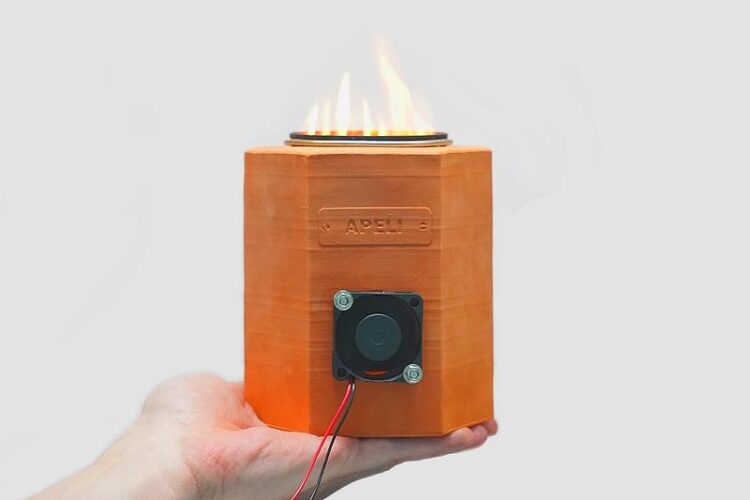DBFZ scientists develop mini cookstove for Africa

The "Apeli" cookstove developed by the DBFZ for Africa: small, clean, efficient and affordable
(c) Dr. Dennis Krüger / © DBFZ
Small, clean, efficient and affordable:
Deforestation in African regions and many other parts of the world is increasing rapidly. The reasons for this are growing population and the increased use of wood/charcoal as cooking fuel. Against this background, a cookstove was developed for special requirements in Togo as part of the “LabTogo” project funded by the Federal Ministry of Education and Research (BMBF). The DBFZ’s new development not only requires significantly less fuel than traditional stoves, but also has lower emissions during operation.
In West African Togo, biomass accounts for about 80 % of energy consumption. This is mainly needed for cooking as well as for heat generation. While inefficient cooking fires with high emission levels and corresponding health consequences are the rule in rural regions, charcoal stoves are predominantly used in the city. For both paths, the required wood is usually taken directly from the forest and used for cooking or processed into charcoal. This uncontrolled and unsustainable wood extraction subsequently leads to a rapid and steady decline in African forest areas.
In the “Apeli” stove developed by the DBFZ, combustion is based on a multi-stage process that enables the fuel (wood pellets and local residues such as bamboo or palm kernel shells) to be used thermally in its entirety. In this process, the biomass is first completely converted into a fuel gas, which is then cleanly burned with air. The use of a commercially available tin can (73×110 mm) as a combustion chamber base enables the extremely small dimensions of the burner with correspondingly low material input. In order to further reduce costs, a ceramic casing was used, which can be produced cheaply in large quantities using a casting process. The stove also includes a pot holder, which is in the form of an external frame that securely houses the burner and can also support large and heavy pots. The estimated retail price in Togo will be about 10 USD if mass produced, making it affordable for broad sections of the population.
The innovative development was tested in practice on site and in daily cooking operations in Togo over a period of months. The users particularly emphasised the shorter cooking times, the significantly lower fuel consumption and the practically smoke-free and odourless operation. In a simultaneous comparison test under field conditions with a cooking fire and a charcoal stove, the “Apeli” convinced with significantly higher performance. When using wood pellets, it was shown that a cooking fire requires five times and a charcoal stove even twenty times as much wood over the entire fuel production process with the same result.
A nationwide introduction of the “Apeli” could, in addition to significantly reduced emissions, also make an extensive contribution in reducing wood harvesting and promote alternative fuels that are fast growing (e.g. bamboo) or have residual character (e.g. palm kernel shells). The possibility of local production with simple production methods also creates local added value and jobs for craftsmen and small businesses. This also ensures the long-term availability of cookstoves and spare parts, almost independently of imports.
Smart Bioenergy – innovations for a sustainable future
The DBFZ works as a central and independent thinker in the field of energy and material use of biomass on the question of how the limited available biomass resources can contribute to the existing and future energy system with sustainability and high efficiency. As part of the research the DBFZ identifies, develops, accompanies, evaluates and demonstrates the most promising fields of application for bioenergy and the especially positively outstanding examples together with partners from research, industry and public. With the scientific work of the DBFZ, the knowledge of the possibilities and limitations of energy and integrated material use of renewable raw materials in a biobased economy as a whole should be expanded and the outstanding position of the industrial location Germany in this sector permanently secured – www.dbfz.de/en.
Wissenschaftliche Ansprechpartner:
Dr. Dennis Krüger
Phone: +49 (0)341 2434-759
E-Mail: dennis.krueger@dbfz.de
Dr. Özge Mutlu
Phone: +49 (0)341 2434-544
E-Mail: oezge.mutlu@dbfz.de
Originalpublikation:
www.mdpi.com/1996-1073/16/7/3278
Weitere Informationen:
https://www.dbfz.de/en/press-media-library/press/press-releases/small-clean-effi…
https://www.dbfz.de/en/projects/labtogo
Media Contact
All latest news from the category: Power and Electrical Engineering
This topic covers issues related to energy generation, conversion, transportation and consumption and how the industry is addressing the challenge of energy efficiency in general.
innovations-report provides in-depth and informative reports and articles on subjects ranging from wind energy, fuel cell technology, solar energy, geothermal energy, petroleum, gas, nuclear engineering, alternative energy and energy efficiency to fusion, hydrogen and superconductor technologies.
Newest articles
Faster, more energy-efficient way to manufacture an industrially important chemical
Zirconium combined with silicon nitride enhances the conversion of propane — present in natural gas — needed to create in-demand plastic, polypropylene. Polypropylene is a common type of plastic found…

Energy planning in Ghana as a role model for the world
Improving the resilience of energy systems in the Global South. What criteria should we use to better plan for resilient energy systems? How do socio-economic, technical and climate change related…

Artificial blood vessels could improve heart bypass outcomes
Artificial blood vessels could improve heart bypass outcomes. 3D-printed blood vessels, which closely mimic the properties of human veins, could transform the treatment of cardiovascular diseases. Strong, flexible, gel-like tubes…





















